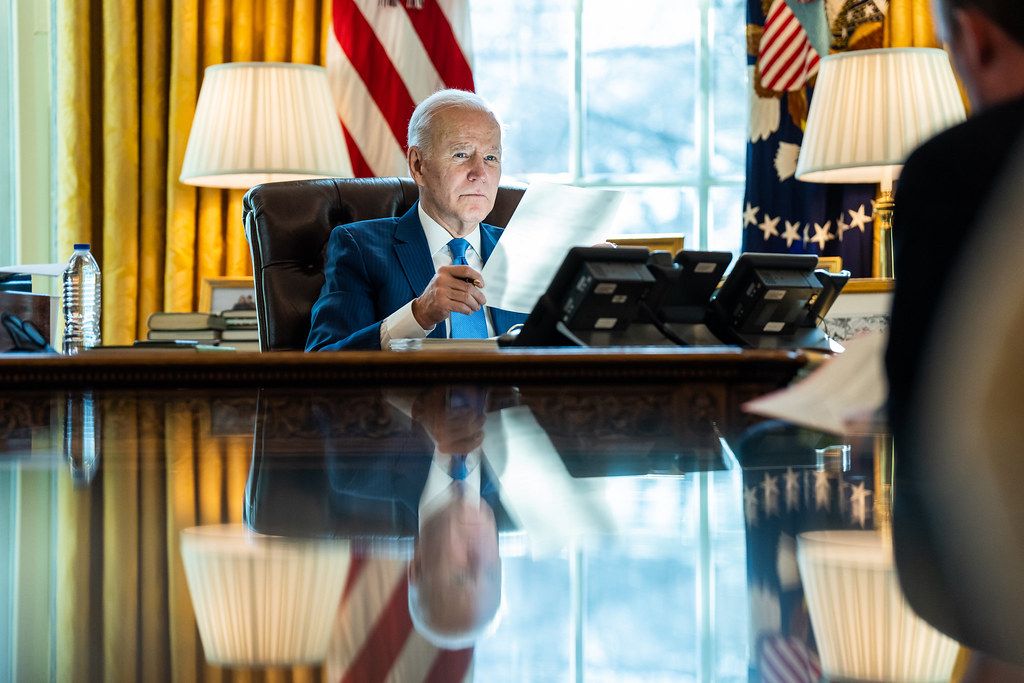Biden’s horse-trading on nuclear technology and fuels is an unprecedented proliferation risk
By Alan J. Kuperman | September 6, 2023
 President Joe Biden talks on the phone with King Salman of Saudi Arabia on February 9, 2022, in the Oval Office of the White House. (Official White House Photo by Adam Schultz, via Flickr)
President Joe Biden talks on the phone with King Salman of Saudi Arabia on February 9, 2022, in the Oval Office of the White House. (Official White House Photo by Adam Schultz, via Flickr)
News media in the United States rarely report on nuclear proliferation until it reaches the crisis stage—as in North Korea and Iran. By then, however, it is typically too late to stop the spread of nuclear weapons. Effective nonproliferation must begin much earlier, not only by suppressing demand for nuclear weapons but also by restricting supplies of the fissionable materials necessary to build them in the first place. Sadly, the Biden administration is bungling this latter responsibility.
To acquire the bomb, nuclear aspirants must first obtain its key ingredient: plutonium or highly enriched uranium (HEU). So, as demand for nuclear weapons grows in Asia, the Middle East, and Europe, one would expect the US government to do everything it can to clamp down on supply. Instead, President Joe Biden is actually doing just the opposite, by promoting commerce in weapon-usable nuclear materials as a bargaining chip for other issues. Unless the president reverses course, one of his greatest foreign policy legacies could wind up being global nuclear proliferation.
The spike in demand for nuclear weapons has been driven by several key events over the past two decades.
In 2003, a US-led military coalition invaded Iraq and overthrew the regime of Saddam Hussein, who had abandoned his nuclear program a decade earlier. The lesson for nuclear deterrence was not lost on other countries, including North Korea which tested its first atom bomb barely three years later. Since then, North Korea’s rapid expansion and upgrading of its nuclear arsenal has fueled demand in Asia. In South Korea, for example, an overwhelming majority now favors acquiring nuclear weapons, and President Yoon Suk Yeol recently said it may happen.
Exacerbating the demand problem, in 2011, NATO countries bombed and helped overthrow the Libyan regime of Muammar Qaddafi, who had voluntarily surrendered his nuclear weapons program eight years earlier. Iran’s supreme leader, Ayatollah Ali Khamenei, aptly observed that Qaddafi had “wrapped up all his nuclear facilities, packed them on a ship, and delivered them to the West.” As one Iranian insider noted soon after: “Judging from that, our leaders assess that compromise is not helpful.”
Iran’s subsequent expansion of uranium enrichment, both before and after the 2015 Joint Comprehensive Plan of Action (JCPOA), and revelations of its secret bomb program, have spurred demand among neighbors. In 2018, Saudi Arabia’s crown prince, Mohammed Bin Salman, declared, “[W]ithout a doubt if Iran developed a nuclear bomb, we will follow suit as soon as possible.”
Most recently, Ukraine’s victimization after surrendering its Soviet nuclear arsenal and Russia’s deployment of nuclear missiles to Belarus have fueled demand for proliferation even in Europe. Poland recently requested that nuclear weapons be deployed on its territory, in what would be the first expansion of NATO nuclear sharing in more than six decades.
Considering this growing demand for nuclear weapons, an essential policy to avert proliferation is to block the supply of the necessary fissionable materials. Regrettably, the Biden administration instead has taken four steps that would foster proliferation of both plutonium and weapons-grade uranium.
First, President Biden is funding US companies like Oklo that want to reprocess used reactor fuel—how plutonium is obtained in the first place, by separating it from nuclear waste—and then deploy its fuel recycling technology “on a global scale.” This would reverse nearly half a century of bipartisan US policy opposing such activity at home and abroad, which has succeeded at restricting commercial reprocessing to only two countries, France and Russia, both of which already have nuclear weapons.
Second, the Biden administration is providing a $2 billion subsidy to Bill Gates (currently the fifth richest person in the world) to develop exotic “fast” nuclear reactors, which originally were designed explicitly to increase supplies of plutonium. Gates’s nuclear energy startup Terrapower promises not to use them this way, but the reactors are so expensive that countries importing them could cite economics to justify turning them into plutonium factories.
Third, the president is pursuing construction of a civilian US research reactor using weapons-grade HEU fuel for the first time since the 1960s, thereby threatening to undermine decades of progress in delegitimizing this dangerous fuel globally.
Fourth, the White House has agreed to export tons of weapons-grade uranium—an amount sufficient for hundreds of nuclear bombs—to fuel Australia’s forthcoming SSN-AUKUS nuclear-powered submarines. This announcement already has prompted at least one other country, Iran, to suggest that it too may produce HEU for naval fuel—a well-known back door to nuclear weapons. The good news is that Australia’s submarines likely could be redesigned to use low-enriched uranium that is unsuitable for nuclear weapons. Unfortunately, the Biden administration recently canceled funding for the eight-year-old program to develop such proliferation-resistant naval fuel.
Why is President Biden doing all this? The US president seems to think he can prevent proliferation solely by quashing demand—using carrots and sticks to persuade countries not to seek the bomb—despite evidence to the contrary. So, he feels free to relax supply restrictions in political horse-trades. For example, to persuade legislators to support solar and wind power, he is funding not just prudent nuclear research, but also their boondoggles to expand use of plutonium and HEU fuel. To ensure US military support for the trilateral Australia-United Kingdom-United States (AUKUS) deal, he is acquiescing to Navy insistence on using weapons-grade uranium reactor fuel, even in exported submarines. However, recent spikes in demand for nuclear weapons, among friends and foes alike, suggests this is a dangerously short-sighted approach.
Of course, the United States should continue trying to reduce demand for proliferation, including by avoiding attacking any more countries that have halted their nuclear weapons programs like Iraq and Libya. But if President Biden imagines that demand-suppression is a silver bullet that gives him license to expand civilian commerce in nuclear weapons-usable materials, he is deeply mistaken. Unless Biden changes course, his promotion of such dangerous nuclear technologies will enable supply to meet demand—in the market of mass destruction.
Together, we make the world safer.
The Bulletin elevates expert voices above the noise. But as an independent nonprofit organization, our operations depend on the support of readers like you. Help us continue to deliver quality journalism that holds leaders accountable. Your support of our work at any level is important. In return, we promise our coverage will be understandable, influential, vigilant, solution-oriented, and fair-minded. Together we can make a difference.















“The genie is out of the bottle and she’s pregnant.”
Some fast reactors breed plutonium. And some can burn “spent” nuclear fuel. We could use those to clean up our nuclear “waste” disposal problem, and we might have enough such wasted fuel already out of the ground to supplement renewables until fusion comes on line. Elysium Industries molten chloride fast reactor looks particularly safe and efficient, and they claim it will burn everything from U-235 to minor actinides to short-half-life fission products.